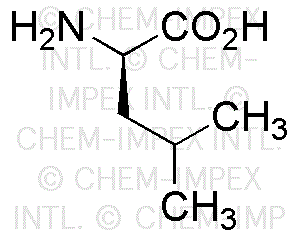D-Leucine is widely utilized in research focused on:
- Protein Synthesis: As a branched-chain amino acid, D-Leucine plays a crucial role in muscle protein synthesis, making it popular among athletes and bodybuilders for enhancing recovery and muscle growth.
- Nutrition Supplements: Commonly found in dietary supplements, it helps improve exercise performance and reduce muscle breakdown, appealing to fitness enthusiasts and health-conscious individuals.
- Pharmaceuticals: D-Leucine is used in the formulation of certain medications, particularly those targeting metabolic disorders, providing therapeutic benefits for patients with specific health conditions.
- Food Industry: It serves as a flavor enhancer and nutritional additive in various food products, appealing to manufacturers looking to improve the taste and nutritional profile of their offerings.
- Research Applications: In biochemical research, it is utilized to study metabolic pathways and protein interactions, offering insights that can lead to advancements in health and medicine.
Informations générales
Propriétés
Sécurité et réglementation
Applications
D-Leucine is widely utilized in research focused on:
- Protein Synthesis: As a branched-chain amino acid, D-Leucine plays a crucial role in muscle protein synthesis, making it popular among athletes and bodybuilders for enhancing recovery and muscle growth.
- Nutrition Supplements: Commonly found in dietary supplements, it helps improve exercise performance and reduce muscle breakdown, appealing to fitness enthusiasts and health-conscious individuals.
- Pharmaceuticals: D-Leucine is used in the formulation of certain medications, particularly those targeting metabolic disorders, providing therapeutic benefits for patients with specific health conditions.
- Food Industry: It serves as a flavor enhancer and nutritional additive in various food products, appealing to manufacturers looking to improve the taste and nutritional profile of their offerings.
- Research Applications: In biochemical research, it is utilized to study metabolic pathways and protein interactions, offering insights that can lead to advancements in health and medicine.
Documents
Fiches de données de sécurité (FDS)
La FDS fournit des informations de sécurité complètes sur la manipulation, le stockage et l’élimination du produit.
Spécifications du produit (PS)
Le PS fournit une description complète des propriétés du produit, notamment sa composition chimique, son état physique, sa pureté et les exigences de stockage. Il détaille également les plages de qualité acceptables et les applications prévues du produit.
Certificats d'analyse (COA)
Recherchez des certificats d'analyse (COA) en saisissant le numéro de lot du produit. Les numéros de lot et de lot se trouvent sur l'étiquette d'un produit, après les mots « Lot » ou « Lot de fabrication ».
Numéro de catalogue
Numéro de lot/série
Certificats d'origine (COO)
Ce certificat d'exploitation confirme le pays dans lequel le produit a été fabriqué, et détaille également les matériaux et composants utilisés et s'il est issu de sources naturelles, synthétiques ou autres sources spécifiques. Ce certificat peut être requis pour les douanes, le commerce et la conformité réglementaire.
Numéro de catalogue
Numéro de lot/série
Fiches de données de sécurité (FDS)
La FDS fournit des informations de sécurité complètes sur la manipulation, le stockage et l’élimination du produit.
DownloadSpécifications du produit (PS)
Le PS fournit une description complète des propriétés du produit, notamment sa composition chimique, son état physique, sa pureté et les exigences de stockage. Il détaille également les plages de qualité acceptables et les applications prévues du produit.
DownloadCertificats d'analyse (COA)
Recherchez des certificats d'analyse (COA) en saisissant le numéro de lot du produit. Les numéros de lot et de lot se trouvent sur l'étiquette d'un produit, après les mots « Lot » ou « Lot de fabrication ».
Numéro de catalogue
Numéro de lot/série
Certificats d'origine (COO)
Ce certificat d'exploitation confirme le pays dans lequel le produit a été fabriqué, et détaille également les matériaux et composants utilisés et s'il est issu de sources naturelles, synthétiques ou autres sources spécifiques. Ce certificat peut être requis pour les douanes, le commerce et la conformité réglementaire.


